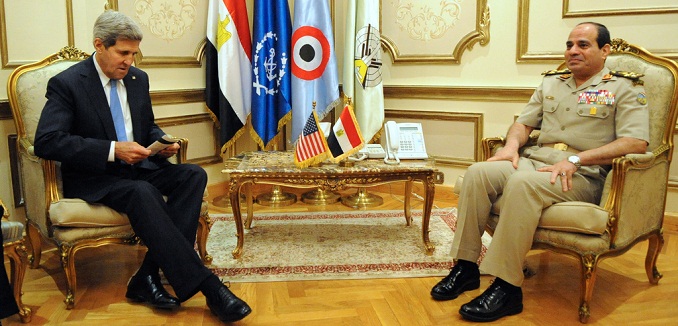Secretary of State John Kerry sought this weekend and today to downplay spiking tensions between Washington and its traditional Arab allies, traveling to Egypt and Saudi Arabia to address sharp and increasingly public differences with those countries on a range of issues including the political situation in Egypt, the U.S’s stance on the Syrian conflict, and the West’s posture toward Iranian negotiations.
“Our relationship is strategic, it is enduring and it covers a wide range” of issues, Kerry told reporters after a rare two-hour meeting with King Abdullah, which ran much longer than scheduled. And he insisted “there is no difference in our mutually agreed upon goal in Syria” at a joint news conference with his Saudi counterpart, Prince Saud al-Faisal.
Cairo and Riyadh have watched Washington’s recent Middle East moves with confusion and increasing frustration, as the Obama administration staked out positions that they argued were in tension with both their and America’s interests. Recent months have seen the solidification of three opposing regional blocs: a traditional pro-U.S. camp composed of Israel and the U.S.’s Arab allies, an extremist Shiite bloc anchored by Iran and including its proxies in Lebanon and Syria, and an extremist Sunni bloc involving Turkey and the Muslim Brotherhood. Washington’s criticism of the Egyptian army’s moves against the Brotherhood, its reluctance to support rebels in Syria, and its approach to Iran have, according to critics, shown insufficient sensitivity to fundamental regional dynamics. Over the weekend the Washington Post published an overview of Arab moves designed to circumvent American policies by more aggressively boosting rebel groups in Syria fighting the Iran-aligned Bashar al-Assad regime.
While the United States and its gulf allies share the same objectives in the region — a stable Egypt, a non-nuclear Iran and a peaceful Syria without Assad — one official said those allies have concluded that none of those objectives will be reached with Obama’s current policy…“When you commit to something and then you don’t deliver on it, that’s when you have a problem,” the Saudi official said. “It is an accumulation of these type of cases, incidents, and on and on.”
In Saudi Arabia Kerry praised Riyadh’s diplomacy, while in Egypt he sought to mend ties with the military regime:
In substance as well as tone, Mr. Kerry’s visit to Egypt reflected the Obama administration’s determination to work with a military leadership that ruthlessly put down protesters from the Muslim Brotherhood, the Islamist movement that put forth the successful candidacy of President Mohamed Morsi, who was ousted on July 3. A military government, now firmly entrenched here, has promised to establish a civilian-led government.
[Photo: U.S. Department of State / Flickr]




